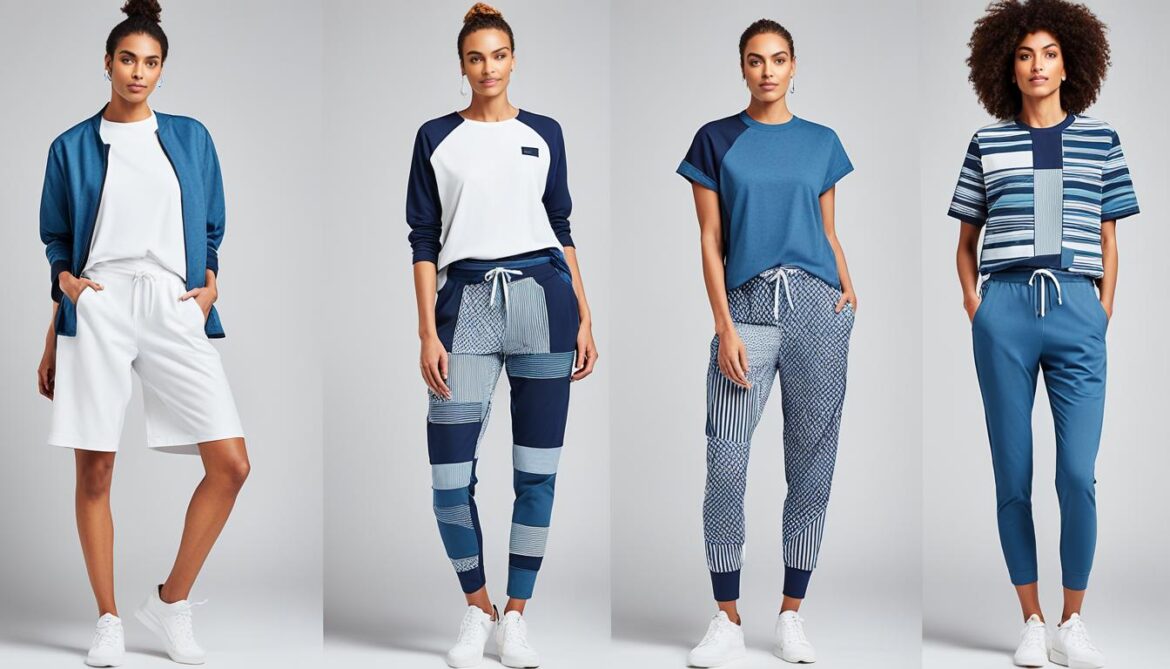If you have a passion for fashion and are looking to start your own business, the clothing industry offers a plethora of opportunities. From lucrative clothing ventures to innovative garment business ideas, there are countless ways to carve out a successful niche in the fashion world. Whether you’re interested in starting a clothing line, exploring online fashion ventures, or focusing on sustainable and inclusive brands, this article will provide you with a wealth of ideas to kickstart your fashion entrepreneurial journey.
Key Takeaways
- Explore fashion designing, starting a clothing line, and fashion styling as potential clothing business ideas.
- Consider online fashion ventures, such as running an online boutique or starting a fashion subscription box service.
- Tap into the growing demand for sustainable fashion and inclusive brands by using organic, recycled, or upcycled materials and embracing size diversity.
- Offer fashion services, including personal styling, clothing alterations, and custom clothing to cater to customers’ unique needs.
- Consider fashion retail and resale options, such as opening a clothing boutique, consignment store, or vintage clothing shop.
Fashion Design and Branding
One of the most exciting clothing business ideas is to become a fashion designer and start your own clothing line. As a fashion designer, you have the opportunity to showcase your creative fashion sense and design unique clothing collections that resonate with your target market. Whether it’s trendy streetwear, elegant evening wear, or casual everyday apparel, the possibilities are endless.
When starting a clothing line, it’s crucial to focus on fashion branding to establish a distinct identity for your business. A strong brand identity not only helps you differentiate yourself in a crowded market but also attracts loyal customers who resonate with your brand values and aesthetic. Consider factors like your brand’s mission, target audience, unique selling proposition, and visual identity when developing your fashion brand.
To give you further inspiration, here are some specialized niches within the fashion industry that you may explore:
- Children’s Clothing: Create adorable and fashionable clothing for kids, catering to the needs and preferences of parents.
- Bridal Wear: Design exquisite wedding dresses and bridal wear, making dreams come true for brides-to-be.
- Knitwear: Explore the world of cozy and stylish knitwear, offering fashionable sweaters and accessories for all seasons.
- Handmade Fashion: Craft handmade clothing and accessories, providing unique and artisanal pieces for fashion enthusiasts.
By focusing on these niche markets, you can target specific customer segments and position your clothing line as a go-to brand in those areas. Remember, innovation and creativity are the keys to success in the fashion industry, so dare to think outside the box and bring your unique vision to life.
| Advantages | Challenges |
|---|---|
| Opportunity for creative expression | Intense competition in the fashion industry |
| Potential for high-profit margins | Constant need to stay updated with fashion trends |
| Ability to build your own brand identity | Managing the complexities of production and supply chain |
| Possibility of collaborations with other designers and influencers | Establishing a loyal customer base |
Online Fashion Ventures
The rise of e-commerce has revolutionized the fashion industry, presenting fashion entrepreneurs with exciting opportunities to establish successful online ventures. Whether you dream of running an online boutique or offering a fashion subscription box service, the online fashion business landscape is ripe with potential.
To maximize your chances of success, it is crucial to choose the right virtual shopping platform that aligns with your business goals. Consider platforms like Shopify, WooCommerce, and BigCommerce, which provide user-friendly interfaces and robust customization options for creating your online store.
Once your online boutique or fashion subscription box service is set up, harness the power of digital marketing to attract and engage your target audience. Implement effective search engine optimization (SEO) strategies, create engaging content, and leverage social media platforms to drive traffic to your website and increase brand visibility.
Another trend gaining momentum in the online fashion retail industry is clothing rental services. By offering a fashion rental model, you tap into the growing market of consumers who desire access to trendy clothing without the commitment of ownership. Over time, this business model can generate a steady stream of recurring revenue while promoting sustainability by reducing fashion waste.
To give you a better idea of the potential within the online fashion business realm, take a look at this table showcasing the revenue and growth of fashion e-commerce:
| Year | Revenue (in billions) | Growth Rate |
|---|---|---|
| 2016 | 72.8 | 0.9% |
| 2017 | 80.1 | 9.7% |
| 2018 | 92.8 | 15.8% |
| 2019 | 113.5 | 22.3% |
| 2020 | 140.4 | 23.7% |
As you can see, the online fashion business has experienced consistent growth in revenue over the past few years, making it a profitable venture for aspiring fashion entrepreneurs.
Sustainable Fashion and Inclusive Brands
The fashion industry is undergoing a significant shift towards sustainability and inclusivity. Consumers are increasingly seeking clothing brands that prioritize ethical practices and cater to a diverse range of body types. This section explores the business opportunities in sustainable fashion and the importance of creating inclusive brands.
Sustainable Fashion
Sustainable fashion focuses on reducing the environmental impact of the industry by using organic, recycled, or upcycled materials. By embracing sustainable practices, fashion entrepreneurs can appeal to environmentally-conscious consumers and contribute to a greener future. Here are some key aspects to consider when starting a sustainable fashion brand:
- Source materials responsibly: Look for suppliers that provide organic or recycled fabrics and ensure ethical manufacturing processes.
- Offer timeless designs: Create clothing that is durable, versatile, and can be worn for multiple seasons, reducing the demand for fast fashion.
- Implement circular fashion practices: Encourage customers to donate or recycle their clothing, and consider offering repair services to prolong the lifespan of your products.

Inclusive Clothing Brands
Size diversity and adaptive clothing are essential elements of creating inclusive brands. By catering to diverse body types and addressing the needs of differently abled individuals, fashion entrepreneurs can tap into an underserved market and foster a sense of inclusivity. Here are some strategies for building inclusive clothing brands:
- Offer a wide range of sizes: Ensure that your clothing line is available in a broad spectrum of sizes, including plus sizes and petite sizes.
- Design adaptive clothing: Consider incorporating features such as magnetic closures, adjustable waistbands, and wheelchair-friendly designs to make clothing accessible for all.
- Promote body positivity: Use diverse models of different sizes, ages, and backgrounds in your marketing campaigns to promote body acceptance and inclusivity.
In summary, sustainable fashion and inclusive brands are thriving in the fashion industry. By aligning with the demand for eco-friendly clothing and addressing the needs of diverse consumers, fashion entrepreneurs have the opportunity to create successful and socially responsible businesses.
| Benefits of Sustainable Fashion and Inclusive Brands | Challenges of Sustainable Fashion and Inclusive Brands |
|---|---|
|
|
Fashion Services and Personalization
In today’s fashion industry, providing personalized services is a key differentiating factor. From personal styling to custom clothing and clothing alterations, there is a growing demand for fashion services that cater to individual needs and preferences.
One business idea in this realm is starting a personal shopping service. As a personal shopper, you can offer personalized style advice, select outfits for special occasions, and help clients build their dream wardrobes. This service is particularly appealing to busy individuals who lack the time or expertise to shop for themselves.
Another lucrative opportunity lies in offering clothing alteration services. Many people struggle to find garments that fit perfectly off the rack. By providing clothing alterations, you can help customers achieve a better fit and enhance their overall style. From hemming pants to adjusting dress sizes, this service can be a valuable addition to your fashion portfolio.
Additionally, the market for custom-made clothing is on the rise. Offering bespoke clothing and tailored services allows you to create unique pieces that reflect your clients’ personalities and preferences. Whether it’s a perfectly fitted suit or a one-of-a-kind dress, custom clothing caters to those who desire exclusivity and exceptional craftsmanship.
Comparison of Fashion Services
| Services | Key Features |
|---|---|
| Personal Shopping | Personalized style advice Assistance in building wardrobes Special occasion outfit selection |
| Clothing Alterations | Adjustments for better-fitting garments Hemming, resizing, and tailoring services Enhancement of overall style |
| Custom Clothing | Unique and tailor-made pieces Reflection of clients’ personalities Exclusivity and exceptional craftsmanship |
By offering fashion services and personalization, you can tap into the growing demand for customized experiences in the fashion industry. Whether it’s helping individuals discover their personal style or providing tailored clothing solutions, these business ideas have the potential to thrive in an ever-evolving market.
Fashion Retail and Resale
Retail and resale play significant roles in the fashion industry, offering various opportunities for aspiring fashion entrepreneurs. This section explores three enticing business ideas: starting a clothing boutique, opening a consignment store, or launching a vintage clothing shop. These ventures allow you to curate unique fashion collections and cater to niche markets, providing customers with distinctive and sought-after clothing items.
A clothing boutique is a perfect endeavor for those passionate about fashion and eager to create a personalized shopping experience. With an eye for style and trend, you can showcase carefully selected clothing pieces, accessories, and footwear, catering to specific customer preferences and lifestyles. By focusing on a particular clothing genre, such as high-end luxury, bohemian chic, or streetwear, you can create a curated collection that embodies your boutique’s unique brand and attracts fashion-savvy clientele.
A consignment store offers a sustainable and affordable alternative to traditional retail. You can collaborate with individuals looking to sell their gently used clothing items, providing them a platform to reach interested buyers. As the owner of a consignment store, you become the mediator between the sellers and buyers, ensuring a seamless transaction and earning a commission on successful sales. This business model allows you to offer a diverse range of clothing styles, sizes, and brands, attracting a wide customer base.
Another intriguing option is opening a vintage clothing shop, where you can showcase and sell unique and timeless fashion pieces from different eras. Vintage clothing holds a special appeal, as it offers customers a chance to embrace nostalgia, stand out from the crowd, and make fashion statements with one-of-a-kind finds. With a carefully curated collection of vintage garments, accessories, and jewelry, you can tap into a growing market of vintage enthusiasts and fashion-forward individuals seeking one-of-a-kind pieces that tell a story.
To enhance your fashion retail and resale business, consider leveraging online platforms and apps that specialize in clothing resale. This includes popular platforms like Poshmark, Depop, or ThredUP, where you can list and sell second-hand clothing items to a broader audience. By embracing the online realm, you can reach customers outside your local area, expand your customer base, and provide a convenient and cost-effective way for fashion enthusiasts to access stylish clothing.
An enticing aspect of fashion retail and resale is the potential for creativity and profitability. By curating unique fashion collections, offering personalized shopping experiences, and leveraging the power of online platforms, you can build a successful and sustainable business in the dynamic world of fashion.
| Business Idea | Key Features | Target Market | Estimated Startup Costs |
|---|---|---|---|
| Clothing Boutique | Curated fashion collections | Fashion-savvy individuals seeking personalized shopping experiences | $10,000 – $50,000 |
| Consignment Store | Mediator for selling gently used clothing | Budget-conscious shoppers looking for affordable fashion | $5,000 – $30,000 |
| Vintage Clothing Shop | Unique and timeless fashion pieces | Vintage enthusiasts and fashion-forward individuals | $10,000 – $50,000 |
Fashion Industry Support and Education
The fashion industry is a complex and dynamic field that relies on a range of support services and expertise. One lucrative business idea is to provide fashion industry support services, such as fashion design services, CAD services, trend forecasting, textile design, and fashion photography. These services are essential for fashion companies, designers, and brands to bring their creative visions to life and stay ahead in the competitive market.
In addition to support services, there is a significant demand for fashion education programs. Starting a fashion design school, offering fashion merchandising programs, or providing styling courses can be highly profitable ventures. These programs cater to aspiring fashion professionals who want to develop their skills, knowledge, and industry connections. By offering high-quality education and training, you can help individuals pursue their passion for fashion and equip them with the tools they need to succeed in the industry.
Success in the fashion industry relies heavily on talent and knowledge. By providing specialized support services and education, you can position yourself as a valuable resource in the fashion community. Whether you choose to offer fashion design services or establish a fashion education institution, there are ample opportunities to contribute to the growth and development of the fashion industry.
FAQ
What are some clothing business ideas for fashion entrepreneurs?
Some clothing business ideas for fashion entrepreneurs include fashion designing, starting a clothing line, fashion styling, luxury consignment, retailing, and online options.
How can I become a fashion designer and start my own clothing line?
To become a fashion designer and start your own clothing line, you need to use your creative fashion sense to design and sell your own clothing collections. You can also focus on fashion branding and establish a unique identity for your clothing business.
What opportunities are there in the online fashion business?
The rise of e-commerce has opened up opportunities for fashion entrepreneurs to start an online fashion business, such as an online boutique or a fashion subscription box service. Choosing the right virtual shopping platform and leveraging digital marketing tools are crucial in attracting customers.
How can I create a sustainable fashion brand?
To create a sustainable fashion brand, you can focus on using organic, recycled, or upcycled materials in your designs. It is also important to embrace size diversity and design adaptive clothing for differently abled bodies.
What fashion services can I offer?
You can offer personal shopping services, clothing alteration services, and custom-made clothing or tailored services. Personal shopping services involve offering personalized style advice and assistance in building wardrobes. Clothing alteration services cater to customers who need adjustments for better-fitting garments.
What are some fashion retail and resale ideas?
Some fashion retail and resale ideas include starting a clothing boutique, consignment store, or vintage clothing shop. These businesses can curate unique fashion collections and cater to niche markets. Additionally, leveraging online platforms and apps for clothing resale is a sustainable and cost-effective way to access fashionable items.
What business ideas are related to providing fashion industry support?
Business ideas related to providing fashion industry support include fashion design services, CAD services, trend forecasting, textile design, and fashion photography. You can also offer fashion education programs such as fashion design schools, fashion merchandising programs, and styling courses.







